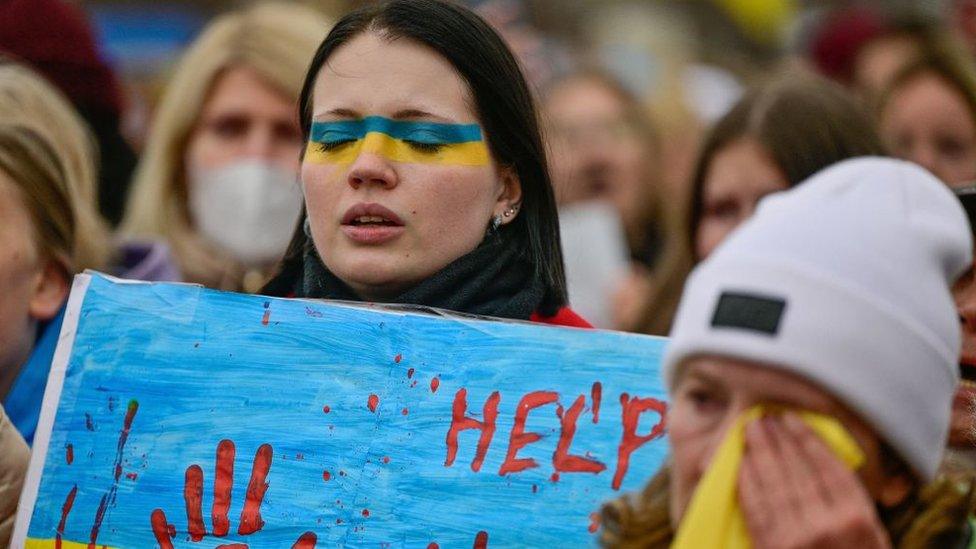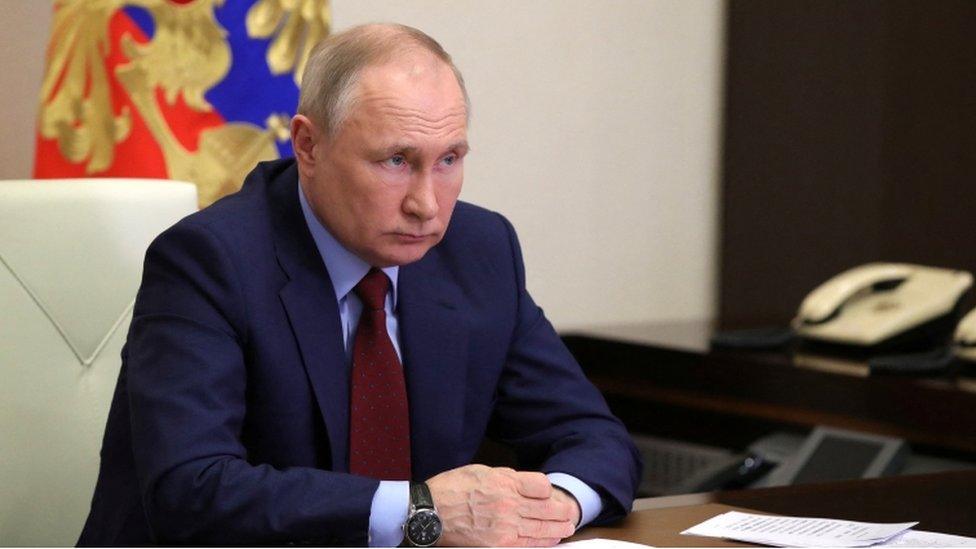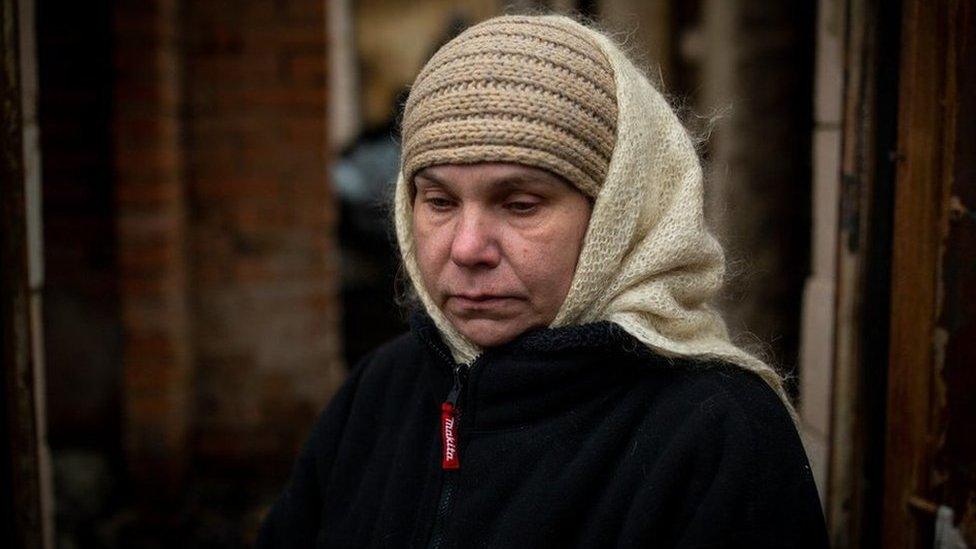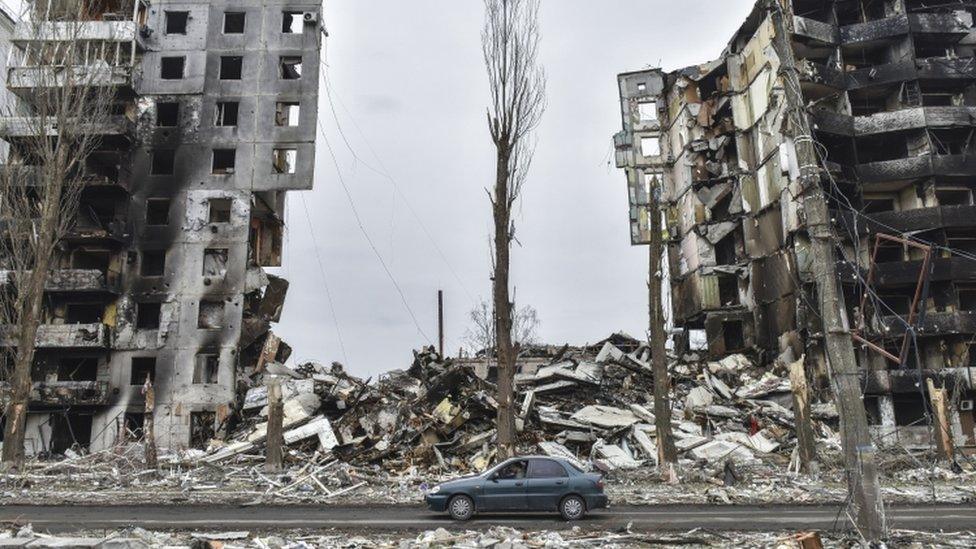Ukraine war: Russians fed twisted picture and one voice - that of Putin
- Published

The murders of civilians in Bucha have outraged the international community, but Russia claims they were staged
The Kremlin denies it all: the footage of bodies lying in the streets in Bucha, the mass graves and the terrible testimony of witnesses. And state TV parrots the narrative.
Since evidence of apparent Russian atrocities emerged from the settlements around Kyiv, programme editors have gone to extraordinary lengths to discredit the reports as a fabrication, a lie concocted by Ukraine and the West.
To switch on Russian TV has, for weeks now, been to step into a weird parallel universe where glossy presenters and well-dressed pundits chronicle a successful "special military operation" in Ukraine. There is no war, just heroic Russian soldiers defending the motherland while taking care to avoid targeting civilians.
The horrific images from Bucha have been broadcast, but viewers are told that the gruesome scenes were staged by Ukrainian officials, with help from the West.
"This was done by professionals, probably British. They're the best in the area of information operations," said commentator Gevorg Mirzaryan. "[They know how] to place the bodies correctly, do everything correctly, create a nice picture for the necrophilic Western consciousness."
Allow X content?
This article contains content provided by X. We ask for your permission before anything is loaded, as they may be using cookies and other technologies. You may want to read X’s cookie policy, external and privacy policy, external before accepting. To view this content choose ‘accept and continue’.

Talk show host Olesya Loseva even suggested that the town of Bucha had deliberately been chosen because President Joe Biden had recently used the word butcher to describe Vladimir Putin, so "for Americans this word should be clear".
It is a classic Kremlin tactic in the face of such accusations - deny, dismiss as fake and, if possible, blame someone else.
Some outlets, including pro-Kremlin tabloid Komsomolskaya Pravda, have published reports accusing Ukrainian troops or militants of being behind the killing of civilians in Bucha.
The newspaper also alleged that "Kyiv propagandists" were controlled by "Western curators". The UK was taking charge of fake news about Russian soldiers raping Ukrainian women and the BBC, Guardian and Independent had helped to promote it, it claimed.
This approach has also been taken up by former President Dmitry Medvedev, who is now deputy chairman of Russia's Security Council. He has gone so far as to accuse Ukraine's armed forces of killing their own civilians "in order to dehumanise Russia and its maximum denigration".
Deep Ukrainianism, fueled by anti-Russian poison and an all-consuming lie about its identity, is one big fake

Vladimir Putin and his officials have consistently sought to portray Russia's neighbour as the aggressor and the West as a threat to Russian security. They have accused Ukraine, aided by the West, of trying to acquire nuclear weapons and develop biological weapons for use against Russia.
One of Vladimir Putin's favourite justifications for the invasion is that Ukraine must be "de-Nazified". It's a commonly repeated narrative that exploits Russia's long and painful memory of World War Two.
The claims of Nazism are completely baseless, but the foreign ministry recently accused the government in Kyiv of being steeped in Nazi ideology and of committing "horrendous crimes".
Many Ukrainians, including President Volodymyr Zelensky, have been horrified by an opinion piece published by Russia's state-owned Ria news agency which they say justifies genocide in Ukraine.
The piece by Timofei Sergeytsev claimed that a significant number of Ukrainians were "passive Nazis" who supported and indulged the "Nazi authorities". Ukraine was unviable as a national state and attempts to build one would logically lead to Nazism, he claimed. "De-Nazification will inevitably be a de-Ukrainisation as well," he added.
"The article describes a clear and calculated procedure for the destruction of everything that makes Ukrainians Ukrainians and our people themselves

Mr Medvedev appeared to take up the theme by claiming "the goal is for the harmony of future generations of Ukrainians and the opportunity to build an open Eurasia from Lisbon to Vladivostok".

War in Ukraine: More coverage
FACT CHECKING: Fact-checking Russian claims about Bucha killings
WAR CRIMES: Could Putin be prosecuted?
READ MORE: Full coverage of the crisis, external

For Russian media, the atrocity in Bucha is just a new example of Ukrainian aggression - an "information war".
Foreign Minister Sergei Lavrov has described what he termed Ukraine's fabrication of Russian war crimes as a "provocation" that threatens international security.
It's hard to say how many Russians believe all that they're told. But there is no significant independent Russian media left and access to social media is severely restricted.

According to the Kremlin, Vladimir Putin has dismissed the murders in Bucha as "crude and cynical provocations" by Kyiv
Opinion polls, even independent ones, are a tricky source in Russia because people are wary of expressing anti-Kremlin sentiment. As such, they suggest high levels of support for Vladimir Putin and his "special military operation".
What were almost daily anti-war street demonstrations have dwindled.
Allow X content?
This article contains content provided by X. We ask for your permission before anything is loaded, as they may be using cookies and other technologies. You may want to read X’s cookie policy, external and privacy policy, external before accepting. To view this content choose ‘accept and continue’.

There are, without doubt, plenty of people who manage to access external and independent news reports and who are horrified and deeply ashamed by what is being perpetrated in the name of their country.
But they're up against a powerful Kremlin propaganda machine and a state that swiftly crushes dissent. In this Russia, there is only really one voice. And it belongs to Vladimir Putin.
Related topics
- Published6 April 2022

- Published6 April 2022
